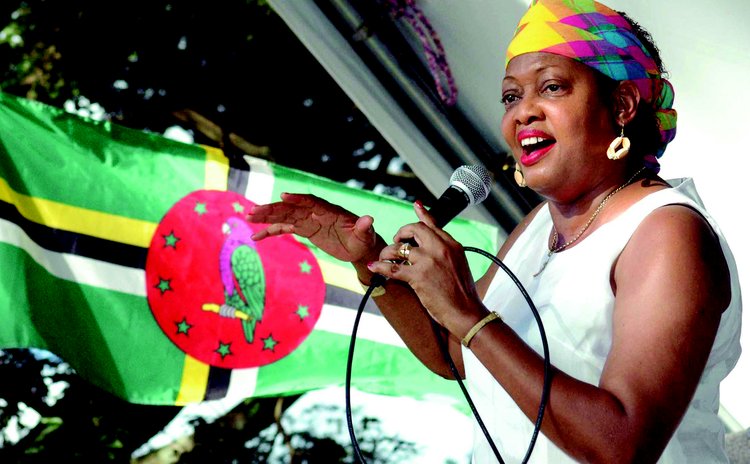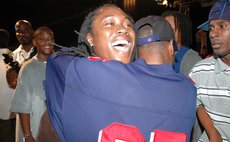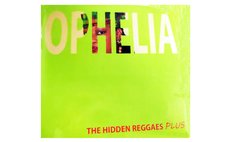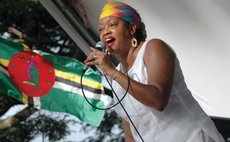A chat with the Grande Dame of Creole music

There is a good reason why Ophelia Marie is known as the Grande Dame of Creole Music.
Her singing voice makes listeners pause, then feel a rush of emotion.
Soothing, melodious, hypnotic-- Ophelia's voice is a unique musical fingerprint-- a signature sound in Creole music and a true national treasure.
That's why it was a treat to chat with Ophelia as she relaxed at her home and main place of business, Chez Opelia Cottage Apartments in Roseau River Valley.
There, she's likely to burst into song from time to time as she reflects on her life, her music and the music she loves.
If you're lucky, she might sing a bit of the famous "Click Song" by Miriam Makeba; and she has the rare talent to replicate the unique click-sounds of the language of South Africa's Xhosa people. Undoubtedly, the Grande Dame of 'cadence-lypso' has played a key role in taking Dominica's music to the world stage.
She has a ready laugh and speaks openly about her life and music with ease.
Ophelia said she was born in Curacao to Dominican parents and came here at the age of nine to live in Pointe Michel.
Brought up in a protective, close-knit household, Ophelia and her siblings have a strong musical background because her dad was in a band and played the organ.
He often played music for his family's entertainment, she said, and it was ingrained in the family's way of life.
Ophelia clearly remembers when she first got the idea of singing on stage. While looking at Barbara Bully singing with the Swinging Stars, she said to herself: "I could do that!"
"I knew at that point that I could hold a microphone… have all those musicians playing around me and be able to carry a tune. I knew that from then," Ophelia recalled.
Back then, she said, singing was not looked upon as a profession. "Singing was seen as something you played at.
"Daddy was a singer, but it was entertainment for other people . . . he probably came home with a paycheck [from singing], but he had another job," she pointed out.
"It wasn't anything that could have become a profession or something you did for a living," she said.
In those days, it was tough for a woman to make meaningful headway in the male-dominated Caribbean music industry.
Her biography relates that some record distributors in the French West Indies initially refused to take Ophelia's records, saying that the public would not buy records produced by a female.
Yet, Ophelia's first album-- produced with the support of her husband, McCarthy 'Mac' Marie-- broke through gender barriers and was a hit in the French West Indies.
Cadence-lypso pioneer, Dominican artiste Gordon Henderson had just started producing music in France and offered to produce the album 'Ophelia'. The album sold 100, 000 copies.
The clincher on that album was the hauntingly beautiful "Aie Dominique, which is now an ageless classic in Dominica's musical tapestry.
Ophelia recalled that the song was not originally intended to be a cadence-lypso piece, but Gordon encouraged her to give it a try.
"I asked him: "Well, okay; how does that go?" They started playing it and I just sang and it just went and it just stayed…" she remembers.
Ophelia explained that she wrote the song herself, inspired by the troubling socio-political events of that time in Dominica.
"All I could do was cry; so I picked up paper and I wrote what I felt," she says. And it's easy to cry to "Aie Dominique, she remarked.
"I remember the first time I tried to do a video they brought me onto a set and asked me to sing over my music. I couldn't sing, I was just crying and crying…
"I had to recompose and try again. When I sing it hurts my heart, it hurts my stomach…"
Like 'Aie Dominique', many of her songs are inspired by her own experiences or those of others.
Ophelia continues to produce albums almost every two years, the last one being 'Selebwasyon' .
Pleased with the National Cooperative Credit Union cadence-lypso initiative, Ophelia said, "We are forgetting that it's on account of cadence that we have so many musicians; that gives us a certain confidence that makes it possible for us to host the WCMF.
"It wasn't because we were playing reggae or blues or rock or whatever…it was because we had a Creole musical expression that was essentially ours, so we must not now throw it away," she declared.
Ophelia has been bestowed with the Maracas D'or in Paris, Dominica's Sisserou medal of honour as well as the Caribbean Cultural Icon award from the CARIFESTA committee.
Her most cherished accolade is her Lifetime Achievement Award bestowed by Sacem in Martinique.
A trained social worker by profession, Ophelia is a mother of two.
By Gwen Evelyn




